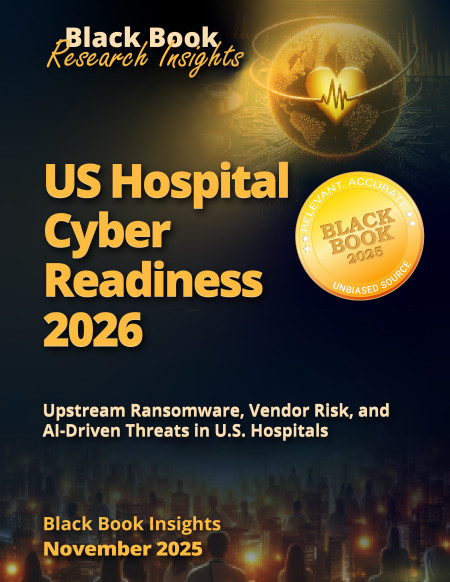U.S. Hospital Leaders Face Critical Vendor and AI Cyber Readiness Gaps Entering 2026, New Black Book Report Now Available
Hospitals struggle to cut off compromised vendors and AI platforms, as the new 2026 US Hospital Cyber Readiness report from Black Book Research delivers actionable intelligence on kill-switch deficits, slow revocation timelines, and contract/insurance misalignment with third-party and AI risk.

CHICAGO, November 24, 2025 (Newswire.com) - A new US Hospital Cyber Readiness 2026 report from Black Book Market Research finds that most U.S. hospitals remain exposed to cyber incidents that originate at vendors, cloud partners, and AI platforms with a median 12-hour delay to fully cut off a compromised partner.
The study concludes that the decisive capability for 2026 is time-to-revoke: how quickly a hospital can cut a compromised partner's access across identity, endpoints, networks, and APIs/data feeds, and that current sector performance is measured in hours, not minutes.
"Hospitals increasingly depend on external platforms for core clinical and revenue services," said Doug Brown, Founder of Black Book. "This report demonstrates that cyber readiness now hinges on how quickly we can isolate those partners when something goes wrong, and on whether we can show boards and regulators objective evidence of that response."
Key findings for boards and executive IT leadership
The report highlights several systemic gaps:
Limited kill-switch capability
Only 11% of hospitals report a tested vendor isolation or kill-switch mechanism.
53% have policy language but no proven mechanism; 36% report none.
63% of CISOs say they do not have a tabletop-tested runbook with a defined SLA for isolating a compromised vendor.
Slow revocation timelines
Median time from incident confirmation to full vendor cut-off is 12 hours.
Only 27% can revoke all vendor identities, tokens, and service accounts within 60 minutes; 49% require 1-8 hours, and 24% require more than 8 hours.
Insufficient vendor due diligence and exercises
68% of organizations have not assessed their top 10 vendors' incident-response capabilities in the past 12 months.
Only 20% can produce current test evidence (e.g., reports, logs, remediation items).
31% require vendor-led simulations, 14% run joint tabletops, and 7% receive formal attestations with documentation.
Contracts and cyber-insurance not aligned to upstream risk
61% lack enforceable SLAs for rapid notification, joint incident response, and forced credential/key isolation.
Between 36% and 48% report exclusions or sub-limits for vendor-triggered incidents.
30% have already experienced cyber-insurance premium surcharges linked to third-party risk.
Control-plane and segmentation gaps
52% maintain a tiered inventory of high-risk vendors, but only 29% have automated tenant-isolation capabilities (for example, API key revocation, SSO de-scoping, or network quarantine).
39% rely primarily on macro segmentation, while only 21% report microsegmentation tied to conditional vendor access.
Outlook for 2026
58% of CISOs expect an increase in vendor-origin cyber incidents in 2026, particularly involving SaaS, shared cloud platforms, APIs, and AI-driven services.
"Readiness equals upstream readiness. Internal defenses don't matter if you can't cut off a compromised vendor or AI platform in under 60-90 minutes and prove it," said Brown.
AI vendors designated as Tier-1 risk: The report recommends that boards treat AI vendors and their underlying model/API hosts as Tier-1 risk by default, alongside EHR and core clinical systems. AI is now embedded in: Clinical documentation and GenAI copilots, Imaging and diagnostic AI, Clinical decision support and analytics, and AI-driven revenue cycle management (AI RCM). These services typically operate "inside the walls," with broad data access and powerful service accounts, sometimes dependent on separate external model/API platforms. A compromise at either layer can affect multiple hospitals simultaneously.
"The data shows that AI is no longer peripheral innovation, it is upstream infrastructure," said Brown. "Governance and contracting need to reflect that reality, including explicit AI-specific kill-switch steps and coverage."
Governance implications for trustees and senior management
For hospital boards, the report frames cyber readiness in governance terms:
Readiness equals upstream readiness. Internal hardening is insufficient if the organization cannot rapidly cut off a compromised vendor or AI platform.
Minutes, not hours. The report proposes a target of 60-90 minutes to complete identity, endpoint, network, and API/data isolation for Tier-1 vendors, with timestamps and evidence.
Evidence over assurance. Regulators, insurers, and boards are expected to look for documented runbooks, tabletop artifacts, and control logs, not just policy statements.
Contracts and coverage as security controls. BAAs/MSAs and cyber-insurance should explicitly support notification SLAs, joint incident response, credential/key isolation, tenant/model shutdown, and log/IOC sharing for vendor and AI incidents.
The report also recommends a short set of board-level KPIs, including time-to-revoke (median and 90th percentile), tested kill-switch coverage for Tier-1 vendors and AI, proportion of privileged vendor/AI accounts under PAM/JIT, percentage of vendor/AI traffic behind ZTNA and microsegmentation, and closure of key contract/insurance gaps.
About US Hospital Cyber Readiness 2026
US Hospital Cyber Readiness 2026 is based on Black Book Market Research flash polls conducted in 2025 with 250 U.S. hospital and health-system leaders and 109 CISOs and senior cybersecurity leaders. The report focuses on upstream ransomware, vendor and AI risk, control-plane maturity, and board-level metrics and playbooks for 2026. Industry stakeholder can download gratis at https://blackbookmarketresearch.com/us-hospital-cyber-readiness-2026
For more information or to request the full report via email attachment visit www.blackbookmarketresearch.com or contact research@blackbookmarketresearch.com
Contact Information
Press Office
research@blackbookmarketresearch.com
8008637590
Source: Black Book Research
